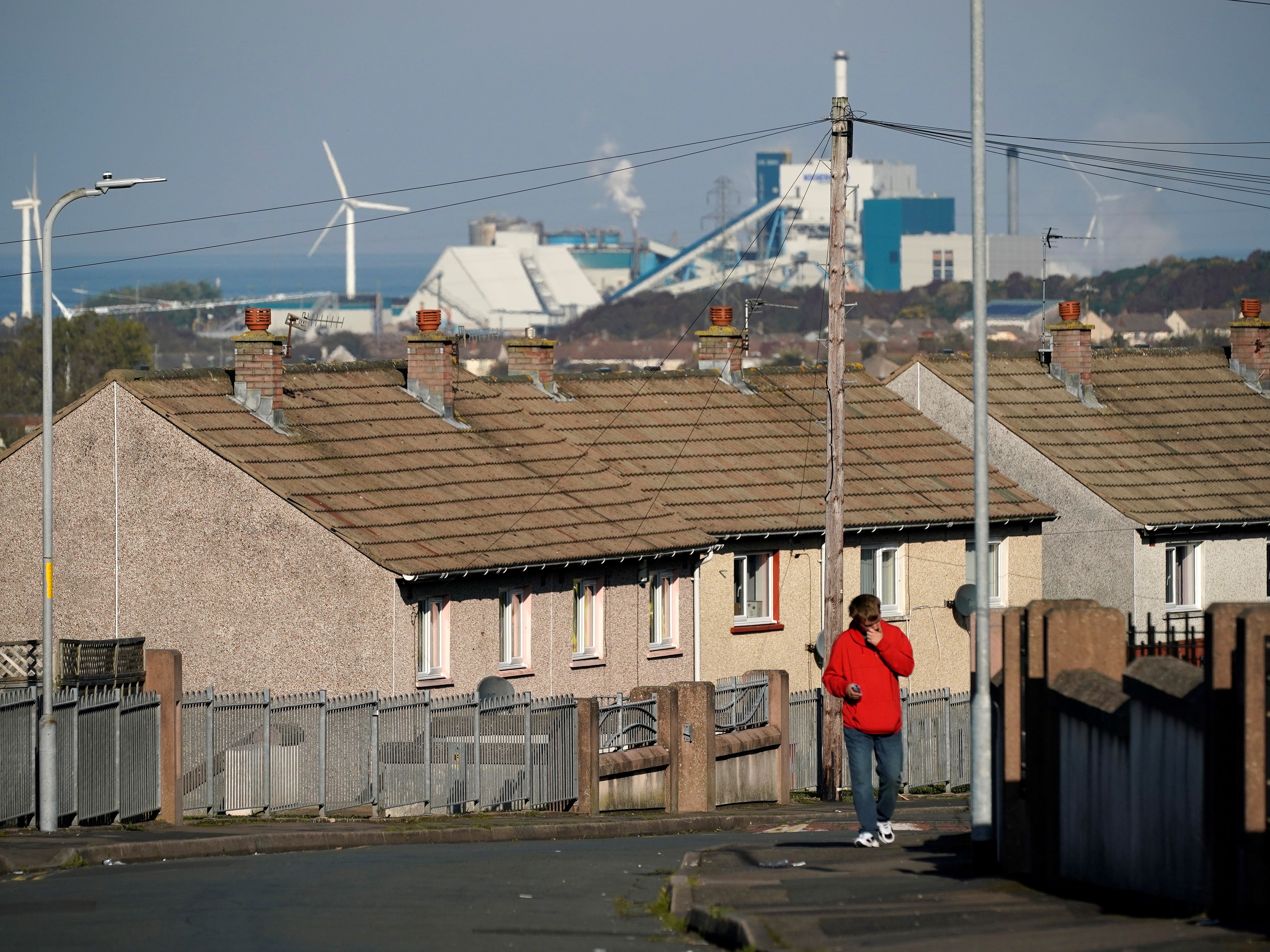‘Nothing has changed’: Workington Man still feeling forgotten a year after voting Tory in red wall’s fall
But, on the anniversary of seismic election, people in this Cumbrian town tell Colin Drury they want Brexit done and remain unconvinced by Labour


Your support helps us to tell the story
From reproductive rights to climate change to Big Tech, The Independent is on the ground when the story is developing. Whether it's investigating the financials of Elon Musk's pro-Trump PAC or producing our latest documentary, 'The A Word', which shines a light on the American women fighting for reproductive rights, we know how important it is to parse out the facts from the messaging.
At such a critical moment in US history, we need reporters on the ground. Your donation allows us to keep sending journalists to speak to both sides of the story.
The Independent is trusted by Americans across the entire political spectrum. And unlike many other quality news outlets, we choose not to lock Americans out of our reporting and analysis with paywalls. We believe quality journalism should be available to everyone, paid for by those who can afford it.
Your support makes all the difference.The last time I was in Workington – a year ago now for the 2019 general election – the world, it barely needs saying, was very different.
Back then, pandemics were the stuff of fiction, or medieval history.
The biggest news in town that night was that this coastal Cumbrian constituency, once one of the most solid bricks in Labour’s great red wall, had elected a Conservative MP for only the second time in more than a century.
In the town’s leisure centre, where it was announced Mark Jenkinson had unseated incumbent Sue Hayman, people (that is, Conservatives) hugged without fearing for each other’s respiratory systems. The next day, in the nearby Wetherspoon pub, drinkers talked about Boris Johnson’s landslide victory entirely unaware of what a social bubble was. When I filed my story from there, I wasn’t required to order a scotch egg.
Yet, a year and a pandemic on from that seismic election, one thing appears much the same in Workington: voters here still feel forgotten and ignored by the mainstream political establishment.
“Most of the people who drink in here were lifelong Labour voters who went Tory and I don’t think there’s one of them, down to a man, who isn’t disappointed now,” says pub landlord Paul Scott today. “The thing is, though, I don’t think any of them, down to a man, like Labour any better.”
We are chatting, socially distanced, in The Grapes, the just-off-town-centre hostelry he has owned for 21 years. He himself calls it a “back street boozer”; the kind of place that still has a darts team, and displays its trophies in the window. Do his regulars talk politics, I ask. “Once they’ve had a pint or two, they start to,” comes the reply.
Why are they disappointed? “Because they still feel forgotten,” says the 54-year-old, who also sits as an independent councillor on the local Allerdale Borough Council. “People have lent their vote because of Brexit and because they were promised change, and nothing has happened. There has been no levelling up. People feel cheated. We keep hearing about pots of money without actually seeing any money.”
There has been a health crisis on, I suggest. “But that should have been used for a reset of the north-south divide, not as an excuse to delay action,” he comes back.
Of all the northern seats to go blue last year, this one – a place still reeling from the closures of its steel industry in the Seventies and Eighties – felt especially totemic.
Winning the support of the so-called Workington Man – a northern caricature; rugby-loving, ale-drinking and Brexit-voting – was identified as key to electoral success. He was white, working class and worried about economic alienation. He had spent a lifetime voting Labour. “That’s pretty much my average customer,” says Scott, who himself voted for an independent. “And me too if it comes to that,” he adds after a moment’s thought.
It perhaps also describes Jenkinson, the area’s new 38-year-old MP.
A former nuclear contractor – and one-time union member – he was born and bred in the area, campaigned for Brexit and, today, is keen to emphasise that, a year into the job, he has already mentioned his constituency more times in parliament than his predecessor did in five years.
When we speak, he says he won the seat because people here “wanted to leave behind the woe-is-me attitude that Labour had, this mindset of ‘never had owt, never gonna get owt’”.
When I mention that some feel the levelling up promised isn’t being fulfilled, he points out that last month’s rewriting of the Green Book – Treasury spending rules long known to have had southern bias – will lead to more northern investment in the coming years.
He also mentions a £5m junction improvements scheme, although later, Scott, will reject this: “junction work isn’t levelling up, it’s everyday maintenance”.
Jenkinson’s biggest draw this time last year was perhaps twofold. Firstly, he was a committed Brexiteer; and secondly, he was not in a party led by Jeremy Corbyn.
The former, to some extent, remains a live issue. Workington voted 61 per cent in favour of leaving the EU. Even on the brink of a no deal, those feelings don’t appear to have changed.
“People like you say it was racist or ignorance,” as one woman out Christmas shopping tells me, of the media. “But it wasn’t. Not for me anyway. The way I see it is things aren’t very good round here anyway so why not shake it up?”
And as for Corbyn’s Labour leadership, it may have done more long-term damage to the party’s standing than some realise, says Janet King.
The current mayor of the town council – her first job was opening a public toilet – speaks as we walk through the main centre, a place where glass fronts and public art abound following a £70m redevelopment 15 years ago.
She herself is an independent councillor but campaigned for Labour at the last election.
“The number of times on the doorstep I was told that they wouldn’t vote for the party while ever he was leader, well, I lost count,” the 72-year-old retired finance officer says, matter-of-factly. “It was constant. So, personally I was very pleased when Sir Kier Starmer was elected. But I’m not sure he’s having much impact up here so far. He hasn’t really made an impression at all.”
A sigh. “People see him as a Remainer,” the grandmother-of-two concludes.
The paradox is that neither Johnson nor Jenkinson – a one-time Ukip member – appear much better loved up here.
“A clown,” is how Lee McGurk, a 30-year-old plasterer, describes the latter.
His stance during the free school dinners controversy appears to have drawn particular ire.
As the government faced intense criticism for abandoning the scheme over October’s half-term holiday – a decision which effectively withdrew support for the lowest income families in the middle of a health crisis – Jenkinson came out fighting on the issue. In Workington, he said, such “food parcels are sold or traded for drugs”.
Safe to say, in the region of Cumbria, where 12,000 families are entitled to the meals and in a town in the top third of England’s most deprived area, the comments weren’t much applauded.
“A clown,” repeats McGurk for good measure, as we speak close to the town’s central Washington Square. “Typical Tory. No idea what hardship is, not interested in helping others.”
Does he himself have kids entitled to free school meals? “No, mate,” comes the reply. “But I’m not so selfish I can’t understand what that would be like. People were kicking off about it but I don’t know what they expected when they voted Tory. Full of Eton boys.”
His workmate, 21-year-old Nicholas Degraff, looks on at this. “I voted for them actually,” he says. “I wanted Brexit done,” he shrugs. “At least that’s happening now.”
A pause. “Is it happening?” he asks. “I’m not really keeping up anymore.”
On the other big issue of the day – coronavirus – the pair both have some sympathy for the government.
Some 88 people have died here with the virus and, while the local economy has, to some extent been protected – manufacturing and nuclear power are two of its biggest sectors – large redundancies are feared when the furlough scheme ends in spring. Hospitality is currently struggling along in tier 2.
Yet, as with other parts of the old red wall I visit, there appears little blame attached to Downing Street.
“They’d have got stick whatever they did,” says Degraff. “Stick for going into lockdown, stick for staying out. Sticking for going into soon, stick for not going soon enough. Couldn’t win.”
I ask about the failures of test and trace, the worst death toll in Europe, an economy hit hardest of all major economies – and am met with a phrase I keep hearing: it was an unprecedented situation.
It is a sentiment echoed, too, by the current stand-in leader of Allerdale council – although this may be unsurprising given he himself is a Conservative.
When we first speak by phone, Mike Johnson, who runs a welding business, is busy with the day job. “Gimme a sec,” the 48 year old says over machinery in the background. “I’m just driving a fork-lift.”
His own rise to local authority power foreshadowed the constituency turning blue, as it happens. Allerdale became a Conservative council in spring last year after almost a decade of Labour control.
“I never thought I’d see a Conservative MP here, though,” says Johnson. “I hoped for it – I saw our values in the values of working people here – but I don’t think I ever expected it to happen.”
Will he see one again next time round, though? “That’s the big question, isn’t it?” he replies. “Difficult to judge at the moment because coronavirus has thrown everything in the air but I think key … is the [levelling up] agenda. It needs to happen. We have got to make sure people’s lives in here are improved. Otherwise, yes, we’ll be one-hit wonders.”


Join our commenting forum
Join thought-provoking conversations, follow other Independent readers and see their replies
Comments